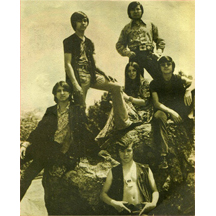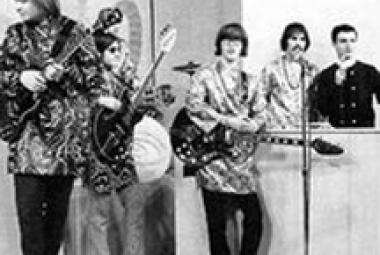UNDER-APPRECIATED ROCK BAND OF THE MONTH FOR AUGUST 2013: SILVERBIRD
SILVERBIRD is a Native American musical ensemble consisting mainly of members of the Ortiz / Silverbird family that has been around for more than 40 years. The album, Broken Treaties was released in 1972 or 1973 on Capitol Records and is (according to Gil Silverbird) the first album by a Native American band to be released on a major record label. A more obscure album by the same band called Getting Together could have been their first (it was released in 1972) on CBS Records and Columbia Records, though this album might have been released mainly in Europe. A third album, Silverbird was released in 1973, on Bravo Records.
* * *
As happened with another previous UARB Queen Anne’s Lace, I have scoured the Internet pretty thoroughly and have found considerable information about the players but very little about the original Silverbird band. The only definitive information on the formation of Silverbird comes from a 1971 newspaper article in the Daily Herald of Provo, Utah (one of the early Biloxi newspapers, The Daily Herald had that name also). The article appears under the heading “Birth of a Navajo Rock Band” and has a dateline of Long Island University; actually, Navajo is not one of the Indian tribes mentioned by J. Reuben Silverbird in his biography.
* * *
The bandleader of Silverbird is Ruben Ortiz (or Reuben Ortiz) who now goes by the name of J. Reuben Silverbird – in fact, almost the entire family now seems to use the Silverbird surname. He has a Facebook page – www.facebook.com/jsilverbird?fref=ts – and also a Facebook “fan club” page – www.facebook.com/groups/73767990708/ .
Additionally, J. Reuben Silverbird has at least four different websites: an American website (www.silverbird.us/), an Austrian website (www.silverbird.at/), a Norwegian website (www.jsilverbird.no/) – translation of the website is available through Google – and an ordinary “dot-com” website (www.reubensilverbird.com/). The websites have completely different looks, but for the most part, they have similar information.
On his websites, J. Reuben Silverbird says that he is “the son of a Nedhni Apache Wise Man and Cherokee Medicine Woman” and has been a musician since he was 6 years old, performing throughout the Southwest. His father was from Mexico, while his mother has Blair/Sequoia roots and is originally from Colorado. The Ortiz/Silverbird family has been in entertainment for generations, and Ruben Ortiz’s family ran a small traveling circus and vaudeville show in Mexico while he was growing up. Although nothing at all is said about the Silverbird band on any of these websites, J. Reuben Silverbird has performed with Diana Ross and Eartha Kitt and has also given numerous solo performances on Native American flute, guitar and percussive instruments, playing his own compositions.
J. Reuben Silverbird is still a musician; his recent albums include the 1991 release The World in Our Eyes (A Native American Vision of Creation) – which earned high praise in its review on the Allmusic website – plus Indian Circle (1992) and Shaman Spirit (2008). However, these days J. Reuben Silverbird primarily speaks on Native American spirituality and participates in retreats and charitable events.
J. Reuben Silverbird is listed on several “fraud” and “hoax” websites, though I imagine that almost anyone in his line of work would be similarly disparaged on some of these websites. (One of these sites, a “wiki” called Psiram gave me some information on Reuben Silverbird that I couldn’t get anywhere else, though they still didn’t have the right information on the Silverbird band).
The main complaint seems to be his affiliation with the Unification Church – a/k/a the Moonies – where he serves as an “Ambassador for Peace” in their affiliated group, the Unification Peace Federation. J. Reuben Silverbird has also engaged in some minor myth-making. However, he has also reportedly appeared at the 90-year-old International Spiritualist Federation and has regularly given ceremonial blessings at the Nobel Peace Institute in Oslo, Norway – hence, the Norwegian website. And he has been on the cover of a major news magazine, U. S. News and World Report – no mean feat.
* * *
Much of the overheated rhetoric about J. Reuben Silverbird is about his name changes; even the minor switch from Ruben to Reuben is mentioned. Using stage names is hardly limited to rock musicians – the very term itself shows that its origin is in the theatre. You needn’t go any further than the drummer for the Beatles to find one: Ringo Starr (born Richard Starkey). Guitarist and songwriter Keith Richards of the Rolling Stones used the name Keith Richard for many years. The John Birch Society called Stones frontman Mick Jagger “Mick Jaeggert” back in the 1970’s; a Google search brought up only two websites using this name – one French and one Hungarian – so this is probably not for real.
When the Byrds were formed in 1964, its front man was called Jim McGuinn; in 1967, he changed his name to Roger McGuinn (his birth name is James Roger McGuinn). Jim McGuinn often wore frail-looking wire-rimmed glasses with tiny rectangular tinted lenses. Back in the day, I thought that this style of glasses was about the coolest fashion statement to come out of the 1960’s – still do in fact. I used to have a pair, and I need to get another one if I can ever find them again.
It is not unprecedented for the front man of a rock band to adopt that name as his new surname. When the British new wave band Adam and the Ants was formed in 1977 (originally called simply the Ants), the chief songwriter and lead singer was known to the world as “Adam” – he was born Stuart Leslie Goddard. Although Goddard had apparently taken the name Adam Ant before forming the band, I don’t remember anyone calling him that until he started his solo career. Of course that left Adam Ant’s former bandmates in the Ants in the lurch; however, Malcolm McLaren – best known as the manager of the Sex Pistols – recruited them to back a barely pubescent Anglo-Burmese singer that he later discovered named Annabella Lwin (that’s not her real name either as I recall, though I can’t seem to find the info online anymore). The resulting band Bow Wow Wow is one of my favorites from the early 1980’s.
Likewise, Alice Cooper was the under-stated name of the lead singer from the beginning, but Alice Cooper started out mainly as the name of the band. The bulky, dirty-yellow Schwann Catalogue – which showed all the records in print in the United States, and which used to sit in one corner of larger record stores back in my youth – identified them as “the Alice Cooper”, and they were listed with the A’s. Once the lead singer of this theatrical band became larger than life, it was more Alice the man than Alice the band. In later years, Alice Cooper frequently appeared on talk shows and game shows as just a regular guy – and that was as startling in its own way as the gaudy make-up that he used in his live performances.
The writer of the first hit song for Steppenwolf, “Born to be Wild” is listed as Mars Bonfire; but that is clearly no one’s birth name. It is not even the man’s first stage name; when he was a member of the predecessor band to Steppenwolf, the Sparrows, he used the name Dennis Edmonton. He was born Dennis McCrohan; he and his brother Jerry Edmonton (born Gerald McCrohan), who was also in the Sparrows, had changed their surnames at the same time. Interestingly, Mars Bonfire had his song shopped to other bands before Steppenwolf got their shot at it; one was a Los Angeles psychedelic rock band called the Human Expression. Front man Jim Quarles chose one of Bonfire’s songs, “Sweet Child of Nothingness” as the “A” side for the band’s third single; but he wasn’t impressed with “Born to be Wild” and passed on that song.
All three of the men who perished on the day the music died weren’t using their birth names – most obviously in the case of the Big Bopper. As suggested by his manager Bob Keane, Ritchie Valens (born, Anglicized, Richard Steven Valenzuela) got a “t” in his first name and shortened his surname in order to widen his appeal. As to Buddy Holly, “Buddy” could have just been a nickname, but “Holly” also didn’t match up exactly to his birth name Charles Hardin Holley (the dropped “e” was inadvertent, they say).
* * *
After the Ortiz family settled in Albuquerque, New Mexico, their first musical foray was as the Ortiz Trio, consisting of Ruben Ortiz, his wife Ginger Ortiz and his younger brother Steven Ortiz. Ruben described the music as “Ranchero style and Bolero style”.
After they moved East, the band’s name was changed to the Coronados; and Steven Ortiz masqueraded as a brother-in-law, rather than a brother, by the name of Steven Coronado. The Coronados recorded a few 45’s but apparently not an album; their music was released on RCA Victor Records.
* * *
This photograph of the Coronados with Jack Spector, a prominent New York City disc jockey on WMCA, was published in Billboard Magazine in 1965. (Spector is notable for having been the first DJ in New York to play the Beatles’ initial Capitol Records single, “I Want to Hold Your Hand” in late December 1963). Their music is described in the Daily Herald article mentioned previously in this way: “The mode became eclectic – show tunes, popular numbers – with a professional gloss appropriate to the Borscht Belt and other resort circuits.”
Meanwhile, the four teenaged children of the bandmembers in the Coronados – who sometimes appeared with their parents on stage – were being attracted to rock music and began singing and performing together as the Real Americans. Gilbert Ortiz (now known as Gil Silverbird), Perry Ortiz and Mark Ortiz are the sons of Reuben Ortiz and Ginger Ortiz; Joerey Ortiz is the son of Steven Ortiz. Reuben Ortiz encouraged them in this endeavor, and he recorded the songs that they were writing using a company that he had formed earlier having the innocuous name of Recording Artists, Inc. Ginger Ortiz began singing with the Real Americans as well, supplying the high vocals that Perry Ortiz was beginning to lose as he matured.
* * *
As an experiment, Reuben Ortiz decided to see how the Coronados and the Real Americans would sound if their music were combined. Ginger Ortiz recalled: “There was a kind of realism to this music. It was a nice contrast to what we’re always supplying as the Coronados: those dreams that our audiences want.”
The result of this merger of the two bands is Silverbird. Their career was launched on May 2, 1971 on one of the Fanfare programs on National Educational Television (NET), a precursor to Public Broadcasting Service (PBS).
* * *
The above is a photograph of the back of Silverbird’s second album Broken Treaties, but the text is unreadable. My copy of Broken Treaties went through Hurricane Katrina, so all I have is the disk. If not for a blog at www.weapon-shaped.com, I might not have gotten all of the bandmembers’ names on the album: Reuben Ortiz, Joerey Ortiz, Perry Ortiz, Steven Coronado, Gilbert Ortiz, Ginger Coronado (now also a Coronado, like Steven), and Mark Ortiz.
Vic Ortiz also contributes to the Broken Treaties album, at least as a songwriter; how he is related to the others is unclear. While he is almost certainly not the boxer Victor Ortiz – Ortiz also appeared earlier this year on Dancing with the Stars – Vic Ortiz is still listed on innumerable Internet sites with the boxer’s nickname: Vicious Vic Ortiz.
* * *
The music on Broken Treaties is basically soft rock; much of the music has lush strings, so Silverbird is often classified as a disco band, even though 1971-1973 is early in the disco era to say the least. However, there are a variety of musical styles and several lead vocalists; and overall, the music has a definite tribal feel. Their voices merge beautifully, providing fine background vocals; on “Would You” and “Poor Boy”, the lead vocals are several singers in harmony.
The opening tracks on each side – “Custer’s Last Stand” and the title song, “Broken Treaties” – deal effectively (and far less provocatively than Buffy Sainte-Marie did on It’s My Way!) with the basics regarding Native Americans; besides the themes that are obvious from the song titles, the songs talk about the slaughter of the buffalo herds and the current poverty among Native Americans. The mood of these two songs is appropriately somber, though the majority of the songs on Broken Treaties are upbeat.
Although Custer’s Last Stand was one of the few Indian victories, it is probably the best known battle involving Native Americans and has been for decades. I recently saw a movie called They Died with Their Boots On – this catchphrase has been popular for years – that portrays George Armstrong Custer heroically; the 1941 movie was apparently highly fictionalized but notes that Custer graduated last in his class from the U. S. Military Academy at West Point. I had learned that about Custer in the “Final Jeopardy” question on a Jeopardy! show a long time ago.
While the other tracks on the album do not directly address Native American issues, there is some social commentary, notably on “Poor Boy”. The final song on the album, “Violet” was singled out for praise by the piece on the album on the www.weapon-shaped.com website. My own favorites on the album are “Broken Treaties”, “Friends”, “At the Party” and “Sonny”.
* * *
When their third album Silverbird came out later in 1973, the bandmembers are listed (mostly without surnames) as Mark (acoustic, electric, lead, and bass guitar), Reuben (acoustic and bass guitar), Gilbert (piano, Rhodes and organ), and Perry (flute and drums), plus Brian McManus (banjo and guitar). The producer though is listed as Reuben Ortiz.
* * *
A new band called Silverbird Family was launched more recently; they are a contemporary Christian group whose song “Happy Mother’s Day” won Reuben Ortiz semi-finalist status in the songoftheyear.com songwriting contest. This band has a Facebook website: www.facebook.com/pages/Silverbird-Family/522630197763115 . The bandmembers in Silverbird Family include Silverbird alumnus Mark Silverbird, his wife Tania Silverbird, and their three children: Natasha Silverbird (12), Richard Silverbird (10), and Caroline Silverbird (8). The website notes that these children represent the 5th generation of entertainers in their family.
* * *
Another former bandmember in Silverbird, Gil Silverbird is active as a musician and also an author. His musical works include a 2004 album, World Peace, plus two 12-inch singles in 1986, “Fool’s Paradise” and “We Can’t Go On (Without Love)”.
Gil Silverbird and his brother Tim Silverbird (Navaho/Apache) are now performing under the name 2 CRAZY Indians. Their Facebook page is at www.facebook.com/Silverbird2CrazyIndians .
* * *















